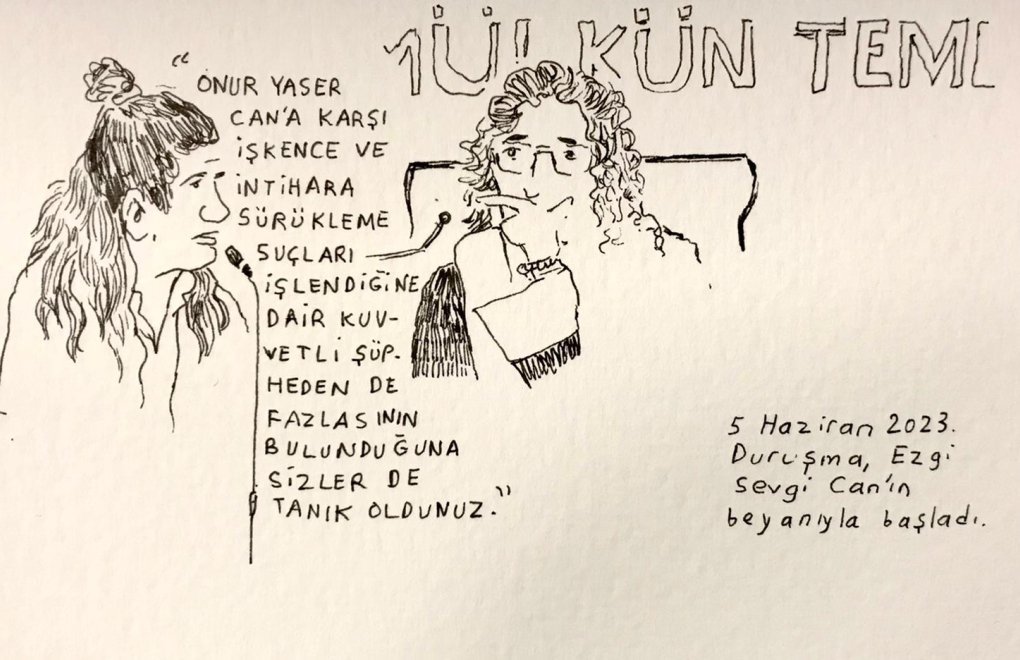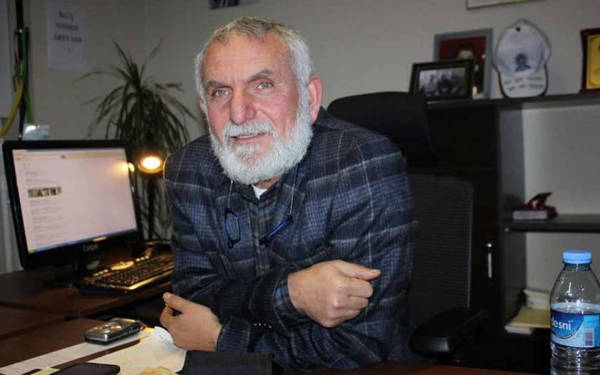Click to read the article in Turkish
The fifth and final hearing of the trial regarding Onur Yaser Can, who committed suicide in 2010 after stating that he had been tortured by the narcotics police, was held today.
The İstanbul 41st Heavy Penal Court sentenced police officers Hakan Aydın, Muhammet Olgun, Onur Ülker, and Yunus Başar, as well as expert witness Zafer Kökdemir, to six years in prison each for the crime of "tampering with or destroying an official document." One police officer was acquitted.
The trial was held in the larger courtroom of the 14th Heavy Penal Court and began at 10:30 am. The defendants participated in the trial via video conference.
During the trial, the defense and statements were heard in response to the prosecutor's indictment presented on April 7. The prosecutor had demanded the punishment of the accused police officers Hakan Aydın, Muhammet Olgun, Onur Ülker, and Yunus Başar for the crimes of "counterfeiting an official document" and "destroying, tampering with, or concealing an official document." The prosecutor had requested Zafer Gökdemir's acquittal.
"For the dignity of human rights..."
The court first allowed statements from those involved. Ezgi Can, the sister of Onur Yaser Can, took the floor. She stated that they clearly revealed the crimes of torture and driving to suicide during the trial, supported by concrete evidence that the court could not ignore.
"I lost my brother first and then my parents due to these crimes committed by the police in pursuit of their own interests.
"In deciding on the charges of counterfeiting an official document and destroying an official document, I urge you to consider these facts and impose the maximum sentence.
"You have witnessed that the defendants did not take the trial seriously and misled justice by providing false testimony. I request that you not grant them any reduction in sentence. I demand this for the dignity of human rights.
"I also request that you file a complaint regarding the torture and driving to suicide. Justice can only be served this way."
"Maximum sentence should be imposed"
Following Ezgi Can, their lawyer Ümit Erdem stated, "The defendants remember the details that are in their favor but conveniently forget the ones that are against them."
Erdem emphasized that the crimes of "misrepresenting the truth as an expert witness," "counterfeiting an official document," and "destroying or tampering with an official document" were continuations of the crime of torture and precursors to driving to suicide. He requested the court to impose the maximum sentence without granting any reduction.
Lawyer Tuğçe Duygu Köksal explained the stages the case went through and said, "The court must file a complaint regarding the torture and ill-treatment."
Then, the court gave the floor to the prosecution. After the prosecution repeated its indictment, the defendants began presenting their defense.
Allegations of torture
Hakan Aydın was the first to speak and stated that he had been convicted and dismissed during the FETÖ investigation. Aydın mentioned that he was responsible for technical surveillance in the unit where he worked before being dismissed, but also conducted physical surveillance due to a lack of superiors.
Aydın claimed that they had detained Can to gather information about a drug gang and that he was not the primary target. He denied the allegations of strip searches, torture, and falsifying documents.
Aydın said, "The initial reason for the investigation was counterfeiting and destruction of documents, but throughout the trial, we have been discussing torture and ill-treatment."
Aydın mentioned that a previous trial had already taken place regarding the allegations of torture and ill-treatment. He stated, "We were asked questions in the hope of finding something by asking questions and searching our mouths. I answered the questions within the framework of the trial."
Then, he explained the functioning of the office and the process that led to the arrest of Onur Yaser Can.
Ezgi Can interjected, saying, "He is blatantly lying." The presiding judge warned Can, saying, "Don't force me to remove you from the courtroom."
Continuing his defense, Aydın referred to the trials he faced related to the FETÖ organization. He talked about the traumas he had experienced. This time, the presiding judge warned Aydın, saying, "What does this have to do with the case?"
After the defendants' defenses, Ezgi Can requested to speak. However, the court, citing procedural reasons, did not allow Can to speak.
In response, Can expressed her frustration, saying, "They are still trying to confuse justice."
The court adjourned the session for a decision, but did not specify the duration.
The audience was asked to leave the courtroom. Additionally, security personnel stated that no audience members would be allowed inside the courtroom after the break. When journalists protested, they clarified, "Not you, but the audience will not be allowed."
The court did not pronounce a judgment regarding the torture charges.
After the break, the court announced its decision. As the doors of the courtroom opened, the court began reading the verdict. The court initially sentenced police officers Hakan Aydın, Muhammet Olgun, Onur Ülker, and Yunus Başar to four years in prison under Article 205 of the Turkish Penal Code for the offense of "tampering with, destroying, or concealing an official document." Subsequently, the court determined that the defendants committed the crime as public officials and increased the sentence to six years.
The court acquitted expert witness Zafer Kökdemir, but did not pronounce a judgment regarding the torture charges. Instead, the court left the discretion to the prosecutor and referred the case back to the prosecution.
Ezgi Can expressed her dissatisfaction with the verdict, saying, "May your justice sink." There was also a dispute between the audience and security personnel upon leaving the courtroom.
Appeal
After the trial, lawyers and Ezgi Can made a press statement outside the courthouse. Can stated that the court had displayed a reflex of protecting the police and mentioned that they would appeal the torture allegations.
Can said, "We will continue the fight without pause. The offense of counterfeiting documents has a statute of limitations of 15 years. Therefore, we have less than 2 years left. Intensive monitoring and continued struggle are necessary regarding this issue. We will restart the process concerning our torture allegations and the dragging into suicide. Unfortunately, they always give us justice in crumbs. I wish these courts could make more courageous decisions."
The lawyers representing the Can family evaluated the verdict and expressed that the decision not to reduce the sentence was positive. However, they stated that they would appeal the lack of judgment regarding the offense of counterfeiting documents and would pursue the torture charge.
What happened?
Onur Yaser Can, a 28-year-old architect, was arrested by the narcotics police on June 2, 2010, in İstanbul's Harbiye district on charges of purchasing marijuana. Can was subjected to torture, sexual harassment, and humiliation by the police at the Narcotics Department where he was taken. The "Release Doctor Report" was unlawfully prepared in the presence of the suspected police officers.
The day after his release, Can was called by the police and forced to return to the police station over the phone, citing the need to "correct a date error" in the records. He was coerced into giving statements against others. Can sought the help of a lawyer.
Despite his statements being taken under torture twice, when the police called him to the station for the third time, Can committed suicide by jumping off the balcony of his apartment on June 23, 2010.
On that night, Can wrote down what he experienced at the police station upon the insistence of his friends. In that note, he described being stripped naked while in custody. He was told to lean against the wall and kept in a crouched position. During this time, the sound of someone crying and pleading with the police was played, he was slapped, and verbally degraded. One of the police officers called me to the police station and made me sign a statement different from my previous one. I was told to become an informant," the note stated.
Following the loss of their son, the Can family initiated a struggle for justice but did not achieve a result. The prosecution issued a decision of non-prosecution regarding the torture allegations and filed a lawsuit against the two police officers who arrested Onur Yaser Can, charging them with document forgery, carrying a maximum prison sentence of 8 years. In the first trial held at the İstanbul 6th Heavy Penal Court, the two police officers were sentenced to 2 years and 6 months in prison each.
15 May 2012'deki initial trial, Hatice Can, the mother, who attended the decision hearing, could no longer bear the pain of her son and chose to end her life by jumping from the window of her house on March 2, 2014.
Mevlüt Can, the father, also passed away at the age of 62 on October 8, 2019, due to internal bleeding caused by a ruptured main artery. The only remaining family member is the younger sister, Ezgi Can.
When the Court of Cassation overturned the decision of the local court on procedural grounds, the trial began anew.
During the retrial at the İstanbul 6th Heavy Penal Court, it was revealed that the CD containing the image (an exact copy) of Onur Yaser Can's footage at the police station and the procedures performed there was not available at the police department. It was also discovered that the image containing the footage and information, which was still under examination, had been destroyed by the expert witness Zafer Kökdemir for security reasons.
The court decided to file a criminal complaint against 4 police officers and 1 expert witness. The İstanbul Governorship did not grant permission for an investigation. However, the decision not to grant permission for the investigation was lifted last year following objections, and a case was opened against the police officers.
In the trial, four police officers, one of whom had been dismissed from duty, including a chief inspector, faced charges of "counterfeiting an official document by a public official, damaging, destroying, or concealing an official document." The expert witness was charged with "providing false expertise or interpretation, counterfeiting an official document by a public official, damaging, destroying, or concealing an official document." The trial began on September 30. (HA/VK)










